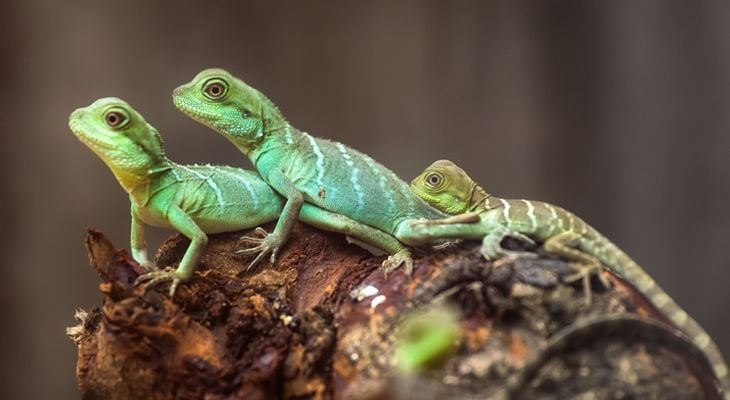On a low carb diet? Planning on sharing some of those low calorie dessert treats with your canine friends? STOP! That sugar-free snack you think is good for you and your dog could actually send you to the veterinarian The sugar substitute, Xylitol, has been a great development in the fight against
Read more

People with limited living quarters may find that reptiles such as lizards or turtles fit perfectly into their lifestyles. Before deciding on a reptile, learn as much as possible about them and their needs. Poisonous snakes and certain reptiles should never be kept as pets. Ask your veterinarian about the suitability of a particular animal before you make your decision. There are many things to consider before committing to a reptile as a pet.
Finding out if a Pet is Legal Where You Live
Many areas have enacted laws pertaining to keeping reptiles. Some are general and some are quite specific; in many places any reptiles that are considered dangerous (venomous snakes, alligators, etc.) are illegal but some places are even more restrictive (for example, in some states all constricting snakes including ball pythons are illegal).
Salmonella Risks and Prevention
All reptile owners need to be informed about Salmonella infections. While the risks shouldn't keep most people from keeping reptiles since with the proper management the risks are minimal. Still, owners should be aware of the risks, and the US Centers for Disease Control recommends that certain risk groups should be careful about contact with reptiles and amphibians.
The Importance of Light and Heat
Many problems with keeping reptiles can be traced back to not providing the proper environmental conditions, particularly heat. Proper lighting is also important for many reptiles. The equipment to provide the proper heat and light to captive reptiles is often quite expensive, but is absolutely essential to keeping pet reptiles healthy. It is important to find out exactly what conditions your reptile needs and never cut corners when it comes to meeting those conditions!
Why Choose Captive Bred Reptiles
There are numerous reasons why you should pick a captive bred reptile if at all possible, as explained here.
How to Pick a Healthy Reptile
It is important to keep in mind that depending on where you get a reptile, it may be very stressed, dehydrated, and prone to illness. Here are some items to look for when buying your reptile to increase the chances of picking out a healthy pet reptile.
While there are many types of reptiles that could be good pets, here we cover a few you could consider.
-
People Food for Pets
-
Online Pet Pharmacies - Saving Money or Risk to Your Pets?
Their ads promise to save you lots of money and even "a stressful trip to the veterinarian". You are encouraged by slick video and professional announcers to purchase flea medications, pain relief drugs and even heartworm prevention all from the comfort of your living room and laptop computer. But, are
Read more -
LabraDoodle
They are all the rage across the United States and beyond. Cross-breed dogs such as cock-a-poos have been around for many years, while newer crosses, such as labradoodles and puggles have just begun to become popular. So, are these dogs a new "hot" breed or just a designer mutt? The current rage
Read more -
How Pet Food Is Made
Many pet owners are just as concerned about what goes into their pet's food as they are about their own food. With so many brands out there, how can a concerned pet lover know that they are feeding the best? How can we know what is going into our friends' diets? With the health of their pets on
Read more -
Helping Your Pet Keep His Cool This Summer
Hot dogs may be a popular summertime treat for baseball fans and backyard cookouts, but allowing our canine friends to overheat is a potential fatal disaster! Keeping our pets cool as the temperatures heat up doesn't have to be a challenge if you keep a few easy facts in mind. Dogs don't sweat
Read more -
Avoiding Dog Bites
Each year almost 5 million dog bites are reported across North America and it is a rare evening on the nightly news when a dog attack is not reported. Yet, according to the Bureau of Labor Statistics, veterinarians and their staff make up a very small percentage of those bites in spite of their obvious
Read more -
Veterinary Ophthalmology
It's been said that "eyes are the windows to the soul" and certainly when you look into the eyes of your beloved pets, you can see the affection and loyalty reflected there. Unfortunately, some owners look deep into their pet's eyes and see problems. When your pet's vision is at stake, veterinary ophthalmologists
Read more -
Senior Pets
Pets are living longer thanks to advances in veterinary care, diagnostics, and earlier intervention. But the key to enjoying our "senior" pets lies not only in extending their life span, but in helping them enjoy their later years to the fullest. Like people, dogs and cats are prone to debilitating
Read more -
Itching Pets
It's a common occurrence: Pet owners expressing feelings of frustration, helplessness and even despair from a single symptom. Their pets itch and scratch, itch and scratch — and it is not a flea problem! Although this may not seem like a big deal, these owners suffer through sleepless nights as their
Read more -
High Blood Pressure in Dogs
Most dog owners would admit a lack of knowledge or perhaps even a lack of concern about canine hypertension, or high blood pressure in dogs. After all, since they don't have the same vices as we do, they shouldn't be at risk, right? Well, the answer may be a little more complex than just life style choices. One
Read more -
Generic Flea Products
For almost two decades, safe, effective flea medications from your veterinarian have helped pet owners battle these blood-sucking parasites. Now, several "generic" flea medications are flooding the market, showing up in big box stores and grocery stores across the country. Will these cheaper medications
Read more -
Feline Retro Viruses
Retro is a word usually bringing warm and fuzzy feelings of nostalgia. But for the more than 80 million cats living in North America, the word retro is anything but warm and fuzzy. Retroviruses like Feline Leukemia Virus (FeLV) and Feline Immunodeficiency Virus (FIV) can be devastating to your cat. More
Read more -
Down & Dirty on Fleas
Many of us enjoy snuggling close to our pets and despite misguided news reports detailing health risks, most of us will continue to do so. But, there is a risk of sleeping with pets and it has to do with diseases carried by our old enemy, the flea. So, what's the best way to shut down this annual pest?
Read more -
Dental Care For Pets
Dental care of dogs and cats is one of the most commonly overlooked areas of pet health care. Approximately 80% of all dogs and cats have periodontal disease by the time they are only two years old. Dental disease affects much more than fresh breath. It frequently leads to more serious health problems
Read more -
Controlling Ticks
To most pet owners, the return of spring is a joyous occasion. The opportunity to spend quality time with your pet outdoors can be an exhilarating experience. Just be sure to watch out for some sneaky critters waiting to feast on your pet's blood! Everyone is well aware of the irritation that
Read more -
Client Survey
Download & Print Client Survey If you do not already have AdobeReader® installed on your computer, Click Here to download. Please download the Client Survey, and fill in the requested information. You can either email, mail, fax, or hand in your completed survey.
Read more

